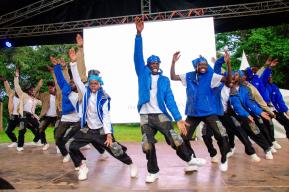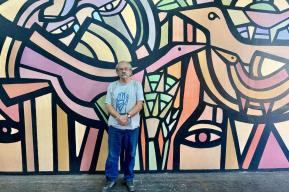This teacher has been working for 10 years in highly vulnerable school contexts and 3 years in reintegration environments. Her day-to-day work takes place in a place where dropping out of school is a latent danger, a situation often linked to low academic self-esteem and "little sense of belonging to school and society in general.” They constantly feel excluded, which makes other areas such as crime and drug trafficking more attractive," says the teacher.
In a school that offers accelerated primary and secondary education (two years in one), with workshops and trade certifications, this teacher teaches history motivated by the conviction that all young people have a high potential to build their future.
UNESCO interviewed Maria Francisca in Santiago, Chile, about how schools form active citizens who build a society for all: "School is a fundamental space to develop self-esteem, to value their own identity and that of their communities, and to develop a life project that makes sense to them and with which they seek to contribute to society, feeling that they are valued members," she says.
Photo (below): Visit to Museo Interactivo Judío. Santiago, Chile
What is it like to learn history in a second chance school with vulnerable students?
Students in contexts of social marginalization do not understand themselves as subjects of rights and duties because they do not feel seen. They are invisible. History class becomes fundamental to creating true social justice, but this is not achieved by telling them that they are important, nor because I am the voice to make them visible. They are the ones who must interrogate the past from their own identities, interpret the present and understand that they can be active agents of history. This allows them to be seen, to look at themselves, to re-signify themselves and their communities, and to feel that they are important members of society, with interest and conviction to contribute.
History has always been written from power, from the victors, and that is why it is important to ask them open questions, to teach them to choose their own sources rigorously, to construct their own questions, interpretations and historical explanations. In class we value subjectivity, but we take care that the interpretations are built on a common ground of shared values.
When the history class is constructed in this way, they become involved in their own learning and the class feels relevant to their own lives, in order to build their identities and their communities. In this same manner, we also manage to promote democratic values such as mutual respect, inclusion, active listening and diversity of viewpoints. In this way, students are able to work with challenging content while developing their own perspectives and voice on an uncompromising foundation of democratic values and grounded in human rights. In class, they learn the value and necessity of participating in civic life and their role in shaping a democratic society.
Photo (below): The Holocaust, a cross-cutting theme in the school curriculum

In your work you have dealt with difficult past topics such as the Holocaust and have visited places of remembrance. How do you manage this topic with your students?
The content in the classroom has to be meaningful. This is the only way we can develop the skills we are looking for in our students. Young people have a lot to say about the difficult issues of the past. Their experiences allow them to look critically at injustices and their impact on history. They are also highly reflective and creative in defining mechanisms of action to prevent such events from happening again.
In 2022, we conducted a project on the Holocaust. For three months we studied this historical event in depth. We read Anne Frank's graphic novel and explored how the stories we tell about ourselves and others have the power to humanize and dehumanize. We discussed the concept of race, and problematized it in light of the Chilean reality, questioning our own beliefs.
We also reviewed how the contexts of political-socio-economic crises awaken the search for solutions or "miracles." We learned how to analyze political propaganda and applied it to current propaganda. We discussed the historical value of testimonies and reflected on how art and poetry serve to express feelings and ideas that are difficult to express in words. We also address how democracy requires certain limits to protect minorities, and how hate speech easily permeates. We also discussed with special emphasis the value of democracy and recognize its fragility, as well as the role we can all play in the face of injustice and how we can be agents of change.
Photo (below): Visit of Rudi Haymann (101 year old Holocaust survivor) to Betania College

Why is it important to you that students learn about historical violence?
History class -through historical evidence- is a fundamental space to build a common, value-based, non-tradable floor for our society. It is essential that they learn about historical violence, as this is the only way to distinguish the forms it takes today and to actively decide to confront it. Through a meaningful and rigorous analysis of the past we can build a society in which human rights are not debatable, understand the value of democracy and build justice, because injustice is understood.
As a history teacher, I focus on students examining pivotal moments in history and learning how decisions in the past have shaped our present. It is key for students to understand that history is not inevitable: people make decisions and these decisions make history.

What is the contribution that citizenship education and teaching about difficult pasts brings to the lives of students in vulnerable situations? What would you like your students to learn and apply with this type of content?
History teaches us that democracies are fragile and can only be kept alive through the active, reflective and responsible participation of their citizens. In an increasingly polarized world, it is more important than ever that students understand and embrace values that are fundamental to upholding the democratic ideals of fairness, freedom, equality, respect and tolerance among people.
I believe that today the rethinking that the entire educational system must have is in how we prepare students to become active and reflective participants in society, who can make a positive difference in the world. Schools, and especially history classes, are microcosms of democracy, a space in which students develop and strengthen their citizenship formation.
History and citizenship education go hand in hand. Today, with the multiple global issues, we must train students with the ability and willingness to understand and act as integral citizens in the face of issues of global significance, such as humanitarian crises, inequality, the climate crisis, hate speech, etcetera. To this end, they need to develop skills such as critical thinking, self-awareness, appreciation of difference, flexibility, curiosity, communication; values such as empathy, solidarity and humility; and the ability to evaluate information and digital literacy, among others.
When we develop these competencies in highly vulnerable contexts, we allow students who have been historically excluded, to form and express a voice about what is happening, what has happened and the future they dream of creating. And for this, we must ensure that the history class is a space that forms citizens who feel that they have something important to contribute, and that their voice deserves to be heard.










